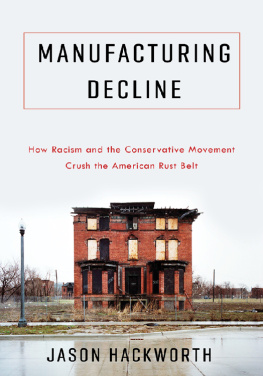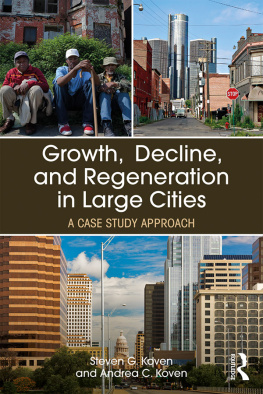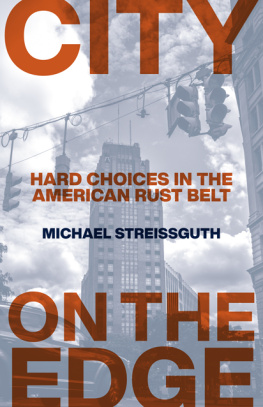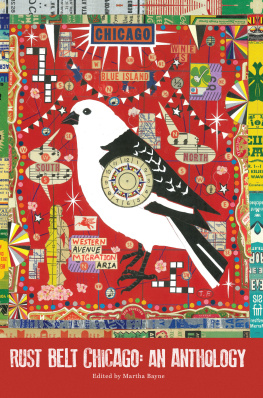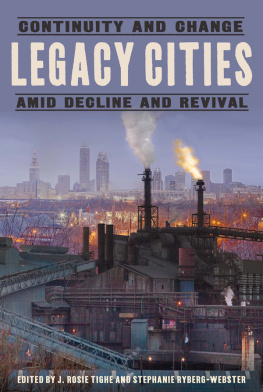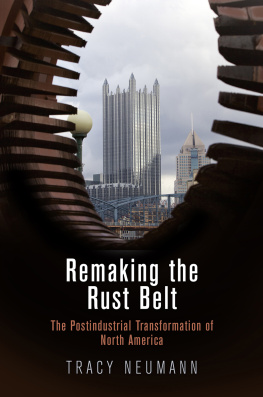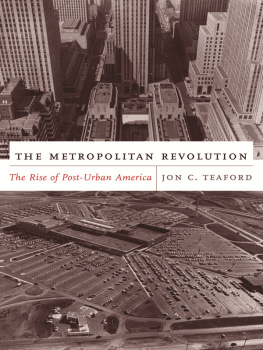MANUFACTURING DECLINE
MANUFACTURING DECLINE
HOW RACISM AND THE CONSERVATIVE MOVEMENT CRUSH THE AMERICAN RUST BELT
JASON HACKWORTH
Columbia University Press New York
Columbia University Press
Publishers Since 1893
New York Chichester, West Sussex
cup.columbia.edu
Copyright 2019 Columbia University Press
All rights reserved
E-ISBN 978-0-231-55047-5
A complete cataloging-in-publication record is available from the Library of Congress.
ISBN 978-0-231-19372-6 (cloth: alk. paper)
ISBN 978-0-231-19373-3 (trade pbk.)
ISBN 978-0-231-55047-5 (e-book)
LCCN 2019010795
A Columbia University Press E-book.
CUP would be pleased to hear about your reading experience with this e-book at cup-ebook@columbia.edu.
Cover design: Noah Arlow
Cover image: Abandoned House, Detroit. Kevin Bauman
CONTENTS
ACSAmerican Community Survey
ALECAmerican Legislative and Executive Council
CBDcentral business district
CCPCenter for Community Progress
CMconservative movement
CRMcivil rights movement
DBRTFDetroit Blight Removal Task Force
DFCDetroit Future City
DRPSDetroit Residential Parcel Survey
DIYdo it yourself
DWSDetroit Water System
EHLNextreme housing-loss neighborhood
GCLBGenessee County Land Bank
GMGeneral Motors
FHAFederal Housing Administration
HOPE VIHome Ownership and Opportunity Everywhere (HUD program)
HUDUnited States Department of Housing and Urban Development
LFRlaissez-faire racism
LIHTClow-income housing tax credits
LLClimited liability corporation
NAACPNational Association for the Advancement of Colored People
NBERNational Bureau of Economic Research
OPECOrganization of Petroleum Exporting Countries
PCSpublic-choice school
SIGTARPSpecial Inspector General for the Troubled Asset Relief Program
SSHRCSocial Sciences and Humanities Research Council
TIFtax increment financing (Districts)
UAWUnited Auto Workers
U-SNAP-BACUnited Streets Networking and Planning; Building A Community
WPAWorks Progress Administration
W HEN Donald Trump was elected president in the early hours of Wednesday, November 9, 2016, a large chunk of the United States was as confused as they were upset. How could a country elect a man who so openly pandered to the most openly racist people in the countrya man who promised a Muslim ban, a man who said that a Mexican American judge was too Mexican to fairly referee the civil suit against his fraudulent university, a man who seemed so fond of scaring white audiences with tales of black-on-black crime in Chicagohow could he get elected after Barack Obama? Didnt the country turn a corner in 2008? Wasnt America supposed to be postracial or at least less openly bigoted now? Activists, authors, and academics who shared the sense of despair and angerbut did not share the surprisebegan to respond on social media, in their classrooms, and on the airwaves with a series of how did this happen? reading lists. It didnt take them long because most had been teaching about racial reaction in America for many years, and there was a considerable body of work from which to draw. The fact that the election of the countrys first black president seemed to provoke the election of a figure who looked and sounded more like George Wallace than Barack Obama was not surprising to themit was expected. Every perceived or real advance of African American political or material rights has been followed by an angry reactionstoked by opportunistic figures like Trump but fueled by millions of white Americans who were very willing to accept the notion that the granting of privileges or rights to nonwhite Americans was, ipso facto, the removal of theirs.
I was very pleased to see W. E. B. Du Boiss Black Reconstruction in America on almost all of those reading lists. For those who have not had the pleasure of reading Black Reconstruction, it is Du Boiss account of how and why racism is in the DNA of American society, how it is a crucial component of class formation, and how it is also simultaneously separate from class formation as understood in a Marxian framework. Black Reconstruction is, in my view, one of the most erudite books ever written about the United States. It is the kind of book where you read a paragraph and then stare off into space for an hour thinking about what you just read. It is a blend of historical materialism, social psychology, and simple conviction. That Du Bois was himself a black man living in the early twentieth-century South gives it a sense of authenticity that is missing in works of political economy written by radical (and nonradical) white visitors from Europe. And yet, Black Reconstruction and the corpus of sociology that Du Bois produced are largely niche within mainstream sociology. When I was an undergraduate sociology major, we read a short excerpt from The Philadelphia Negro. In my African American literature course, we read an excerpt from The Souls of Black Folk. But that was it. In graduate school, I was told how important it was to read Marx, Foucault, and Gramsci if I wanted to be a true political economist, but Du Bois was never mentioned in these conservations. Most sociologists know who he is but relegate him to a week on black contributions to the field or on the early methodological significance of his Philadelphia work. Most Americans dont even know who he was.
The reason that so many scholars placed Black Reconstruction on those reading lists is because it so neatly and presciently laid the foundation for understanding the paradoxical but repetitive pattern of racial progress followed by an angry reaction that often nullifies the progress made in the initial advance. Du Boiss opus was about the first major episode of this sort: the establishment of slavery, the end of slavery, followed by Reconstruction, then an angry multidecade reaction. The initial acts of Reconstruction gave citizenship to people who had been considered subhuman throughout the South only a few years before. It provoked an angry backlash that consisted of lynching and juridical reversals of Reconstruction (i.e., the establishment of Jim Crow). But it also consisted of reactions that were less direct: good faith historians arguing that black people were just not ready to handle the right to vote, and massive expansion of the incarceration system. Authors of the latter sort insisted (as modern conservatives do today) that their efforts have nothing to do with race, but the credibility of such denials seems almost comical to even the most marginally critical historian. Du Bois, unlike other sociologists and historians, understood that this reaction was rooted in the very racialized class construction of the United States during and after slavery. It was not just a matter of convincing working-class whites that they were voting against their interests by siding with plutocratic land owners and corporations over their darker-skinned class compatriots. The identity and materiality of whiteness was much more powerful than that. You cannot simply insist that poor white people are exhibiting a false consciousness as so many European Marxists insisted (and continue to insist). Within this framework it is not hard to understand how poor whites refused to make common cause with poor black people in post-Reconstruction America. More than refusing common cause, poor whites often enthusiastically supported Jim Crow segregation, participated in lynchings, and spit at black people trying to protest one injustice or another. They supported these awful things because the psychic value of whiteness was worth more than the material value of a more egalitarian class structure. They didnt have to be convinced that black progress meant the erosion of white supremacy (and thus their value), because thats what they already felt and had been cultivated to feel by planters during late slavery.

